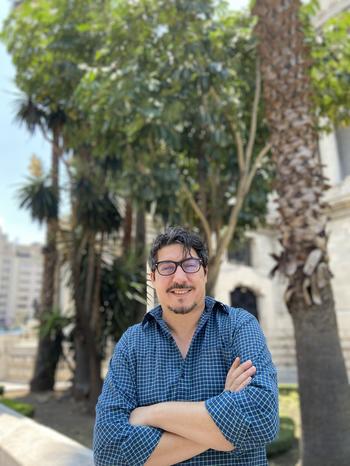Sergio Randi

International Research Training Group 'Temporalities of Future'
PhD Candidate
Political Sciences
Project: "Protest, collective action and future projections in the popular uprising of October 2019 in Chile: Political practices, emerging organizations, future aspirations in the young generations: Towards a democratic refoundation of society?"
Education
|
Since 05/2022 |
PhD Candidate, International Research Training Group ‘Temporalities of Future’ |
|
08/2017 – 11/2019 |
Master in Political and Social Studies at the National Autonomous University of Mexico (UNAM), Mexico |
|
03/2013 – 12/2016 |
History Professor at the Continuous Teacher Training Institute of El Bolsón, Argentine |
|
09/2002 – 09/2009 |
Bachelor in Sociology at the Complutense University of Madrid, Spain |
Work Experience
|
Since 05/2022 |
Researcher, International Research Training Group ‘Temporalities of Future’ |
|
08/2019 – 11/2019 |
Researcher at the “New uncertainties in the world of work: job (in)security conditions and perceptions in Mexico” project at UNAM |
|
03/2016-07/2017 |
Ethical and Citizen Training Teacher at the Higher Education Institute No. 813 of Lago Puelo, Argentina |
|
08/2016-07/2017 |
Social Science Teacher at the Continuous Teacher Training Institute of El Bolsón, Argentina |
Project: "Protest, collective action and future projections in the popular uprising of October 2019 in Chile: Political practices, emerging organizations, future aspirations in the young generations: towards a democratic refoundation of society?"
Supervisors: Benjamin Arditi (UNAM)
This project is interested in the study of the actors and organizational forms emerging during the uprising of the popular-intermediary classes of 2019 in Chile and the ongoing constituent process. It seeks to examine, based on an ethnographic work -that is, focused on the actors, their practices and narratives-, the political practices and forms of protest, their meanings and aspirations for the future. I investigate how the protest of the subaltern sectors is linked to future projections for a different society where representative democracy is questioned, and also, the paradigm of progress and neoliberal economic growth imposed under the authoritarian government of Augusto Pinochet and continued without substantive changes. during the democratic transition.
The sociopolitical practices of the protesters are reactions to the scenario of unintended consequences of the current extractivist economic model and the commodification of all areas of life. The look of the actors on their social reality and their practices helps to understand their commitment to other possible futures by examining the aspirations and anticipations -expressed in a diversity of demands- posed by the young generations of Chilean men and women in the scenario opened by the protest .
As a hypothesis, it can be argued that the temporalities expressed by the different actors of the protest, understood as ways of living, sharing and traveling through the world, point to a different understanding of time and not necessarily linked to a productivist conception and progress, but to a way of being in the world that claims new forms of participation, new relationships between the subject and nature, respect for diverse sex-gender identities and indigenous worldviews that question the hegemonic way of living life in a linear and productivist. Therefore, this horizon of utopias that is expressed in the protest seeks to build a more inclusive and democratic future that challenges state powers and elites
Article
Randi, Sergio Adrian Alejandro (2022) "Jóvenes y subjetividades frente a la inseguridad laboral en México: prácticas, estrategias y significados", Revista Acta Sociológica, nr. 87, january-april 2022, ISSN 0186-6028, Universidad Nacional Autónoma de México, Mexico City


